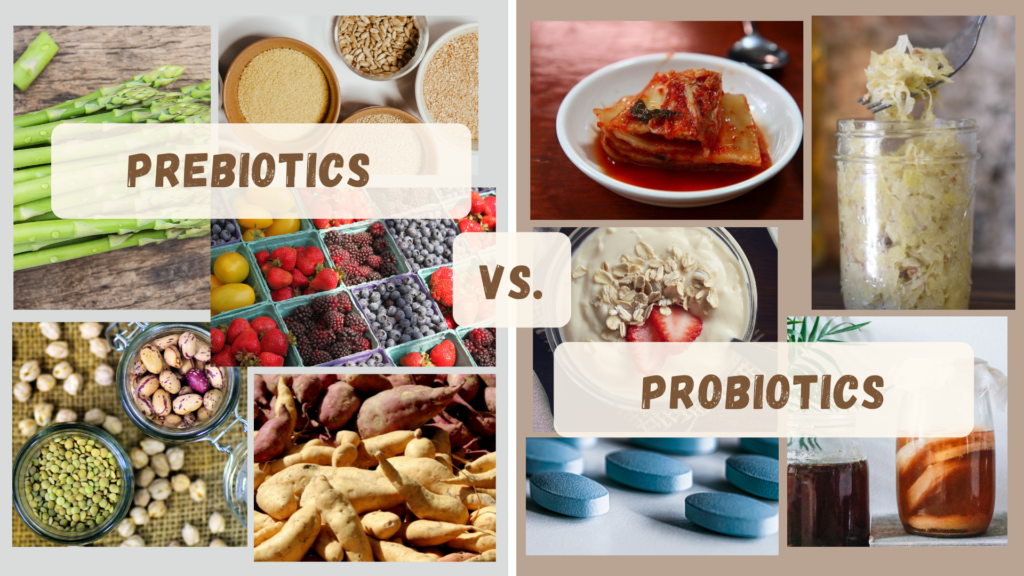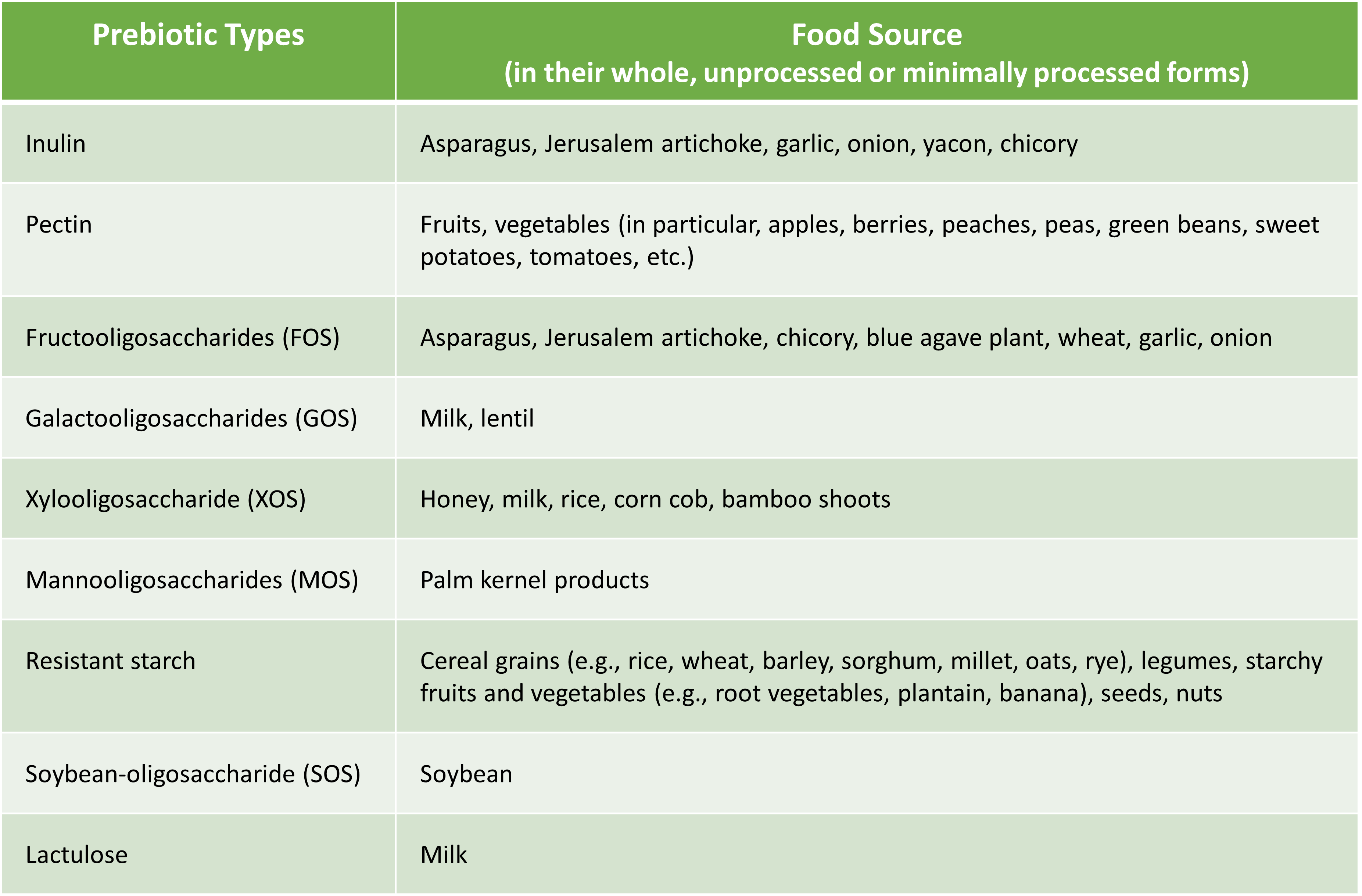Join our mailing list to receive the latest health tips and updates.
You have Successfully Subscribed!
Prebiotics versus Probiotics: Is One Better Than the Other?

The health of our gut or digestive tract is essential for our overall health and yet our gut health is highly dependent on the composition of our gut microbiota (community of microorganisms in the gut, including bacteria, viruses, fungi, etc.).
In recent decades of scientific research, the terms ‘gut-brain axis’, ‘microbiota-gut-brain axis’ and ‘gut-liver axis’ have been coined to signify the important inter-relationship and interdependency between gut, gut microbiota, brain, and liver functions and health.
(For more information on the importance of gut health to our overall health and tips to support healthy gut, please check out my previous articles:
You are What You Eat? Not Quite
Tips to Promote Gut Health for a Healthy Body & Mind)
It is commonly understood that eating probiotic-rich foods (e.g., fermented foods, probiotic supplements) is good for gut health as such foods supply the gut with live beneficial bacteria/microorganisms, thus resulting in a healthier gut microbial composition.
It may be lesser known that consuming probiotic-rich foods alone is not sufficient if you don’t continue to feed the beneficial microorganisms in the gut with the right foods, so that these microorganisms can continue to thrive and colonize in the gut.
Certain dietary fibers and resistant starch in whole plant foods (e.g. whole fruits, vegetables, legumes, whole grains, etc.) called prebiotics serve as foods to gut microorganisms. Prebiotics are not digestible by human small intestine. They are passed on to the colon and fermented by the gut microbiota.
Prebiotics promotes the growth, proliferation and activity of beneficial microorganisms in the gut. In addition, fermentation of prebiotics by beneficial microorganisms also results in certain byproducts (metabolites) that exert beneficial health effects, including anti-inflammation, immune system regulation, support of gut health, support of brain and mental health, and reduction in risk of chronic diseases/conditions such as diabetes, heart disease, cancer, obesity, etc.1–3
While the consumption of probiotic-rich foods or supplements can provide transient or short-term enhancement to the gut microbial composition, on-going or sustained consumption of prebiotic-rich foods is needed to maintain healthy gut microbiota in the long run.1
The rest of this article provides more details on what the latest scientific research showed about the influence of prebiotic and probiotic foods on gut microbiota. Food source of prebiotics are also summarized.
How Prebiotics and Probiotics Influence Gut Microbiota
The human gut microbiota is highly individualized and is heavily influenced by both external factors including diet, lifestyle, medication usage, environment toxins (e.g., pesticides/herbicides, food additives/chemicals etc.); as well as internal biological factors including genetics, immune and metabolic regulations. Among these factors, diet was found to the dominant factor.1,12,13
Studies showed that genetics only play limited role (8.8%) in shaping an individual’s gut microbiota.1
Here is a summary of key findings from latest scientific research:1–9,12,13
- The foundational gut microbiota composition of an individual is formed during the critical period of first 2-3 years of life. Mode of infant delivery (where natural childbirth is preferred over C-section), method of infant feeding (where breastfeeding is preferred over formula feeding), medication usage (especially antibiotics) are key influencing factors. Any disruption during this critical period is associated with higher risk of autoimmune diseases and metabolic disorders later in life.
- After about 3 years of age, the gut microbiota composition has stabilized and become resilience to changes, although external factors (diet, lifestyle and medication usage, environmental toxins) and internal biological factors can continue to influence gut microbial composition to a certain extend as discussed below.
- The impact of probiotics consumption (e.g., fermented foods, probiotic supplements) on gut microbial composition is highly individualized and can be transient because the ability of ingested probiotics to gain foothold and colonize in the gut is dependent on the competitive environment of existing gut microbial community of the individual and other internal and external factors previously discussed. The healthier the individual’s existing gut microbiota, the less effect the probiotics consumption may have in altering the gut microbiota.
- Even though probiotics consumption may not lead to permanent or long-term changes to gut microbial composition, the health benefits of probiotic consumptions were still observed in studies. This is because during the period when probiotics are consumed, the transient alteration of gut microbiota composition still results in metabolic interaction of beneficial microorganisms with the human host and the production of fermentation byproducts (metabolites) that exert health benefits.
- Diet is the dominant factor shaping gut microbiota composition.
- A diet rich in prebiotics from whole plant foods is associated with healthy gut microbiota and beneficial metabolites linked to reduced inflammation and reduced risk of chronic diseases.
- A high saturated fat/low fiber diet and a high animal protein diet are associated with increased levels of microorganism species and metabolites linked to increased inflammation and risk of heart disease, metabolic disorders, cancer and other chronic diseases.
- Long-term or habitual dietary intake of prebiotic-rich foods is required to have long-lasting beneficial effect on gut microbiota composition, thus long-lasting health benefits.
- The more diverse in terms of the types of prebiotic plant foods consumed, the higher the gut microbial diversity and stability.
Overall, these findings point to the importance of adopting a habitual diet that consists of a wide variety of whole plant foods rich in prebiotics (see the next section).
Such a habitual diet can provide long-lasting beneficial effects on gut microbiota composition and overall health.
With such a habitual diet as the foundation, the addition of probiotic-rich foods and/or supplements may also provide further health benefits, especially if the existing gut microbiota composition is less optimal and if there are existing health challenges.
Note that microbial fermentation of prebiotics can produce gas and bloating. If one is not accustomed to prebiotic-rich foods in the diet or has pre-existing gastrointestinal (GI) conditions, it is important to slowly introduce and increment the consumption of prebiotic foods, and avoid/limit those foods that result in GI discomfort.5
Food Source of Prebiotics
Food sources of prebiotics are certain nondigestible dietary fibers and resistant starch from whole fruits, vegetables, legumes, whole grains, nuts and seeds.
The common types of prebiotics and their associated food source are summarized in the Table 1 below.2,10,11
In general, a whole foods plant-rich diet is naturally filled with beneficial prebiotics.
Table 1. Food Source of Prebiotics

Related Articles
You are What You Eat? Not Quite
Tips to Promote Gut Health for a Healthy Body & Mind
References
- Leeming ER, Johnson AJ, Spector TD, Le Roy CI. Effect of Diet on the Gut Microbiota: Rethinking Intervention Duration. Nutrients. 2019;11(12):2862. Published 2019 Nov 22. doi:10.3390/nu11122862
- Chudzik A, Orzyłowska A, Rola R, Stanisz GJ. Probiotics, Prebiotics and Postbiotics on Mitigation of Depression Symptoms: Modulation of the Brain-Gut-Microbiome Axis. Biomolecules. 2021;11(7):1000. Published 2021 Jul 7. doi:10.3390/biom11071000
- Cryan JF, O’Riordan KJ, Cowan CSM, et al. The Microbiota-Gut-Brain Axis. Physiol Rev. 2019;99(4):1877-2013. doi:10.1152/physrev.00018.2018
- Szajewska H, Hojsak I. Health benefits of Lactobacillus rhamnosusGG and Bifidobacterium animalis subspecies lactis BB-12 in children. Postgrad Med. 2020;132(5):441-451. doi:10.1080/00325481.2020.1731214
- Holscher HD. Dietary fiber and prebiotics and the gastrointestinal microbiota. Gut Microbes. 2017;8(2):172-184. doi:10.1080/19490976.2017.1290756
- Green M, Arora K, Prakash S. Microbial Medicine: Prebiotic and Probiotic Functional Foods to Target Obesity and Metabolic Syndrome. Int J Mol Sci. 2020;21(8):2890. Published 2020 Apr 21. doi:10.3390/ijms21082890
- Kolodziejczyk AA, Zheng D, Elinav E. Diet-microbiota interactions and personalized nutrition. Nat Rev Microbiol. 2019;17(12):742-753. doi:10.1038/s41579-019-0256-8
- Wu GD, Chen J, Hoffmann C, et al. Linking long-term dietary patterns with gut microbial enterotypes. Science. 2011;334(6052):105-108. doi:10.1126/science.1208344
- David LA, Maurice CF, Carmody RN, et al. Diet rapidly and reproducibly alters the human gut microbiome. Nature. 2014;505(7484):559-563. doi:10.1038/nature12820
- Lamuel-Raventos RM, Onge MS. Prebiotic nut compounds and human microbiota. Crit Rev Food Sci Nutr. 2017;57(14):3154-3163. doi:10.1080/10408398.2015.1096763
- Dreher ML. Whole Fruits and Fruit Fiber Emerging Health Effects. Nutrients. 2018;10(12):1833. Published 2018 Nov 28. doi:10.3390/nu10121833
- Tsiaoussis J, Antoniou MN, Koliarakis I, et al. Effects of single and combined toxic exposures on the gut microbiome: Current knowledge and future directions. Toxicol Lett. 2019;312:72-97. doi:10.1016/j.toxlet.2019.04.014
- Koontz JM, Dancy BCR, Horton CL, Stallings JD, DiVito VT, Lewis JA. The Role of the Human Microbiome in Chemical Toxicity. Int J Toxicol. 2019;38(4):251-264. doi:10.1177/1091581819849833
